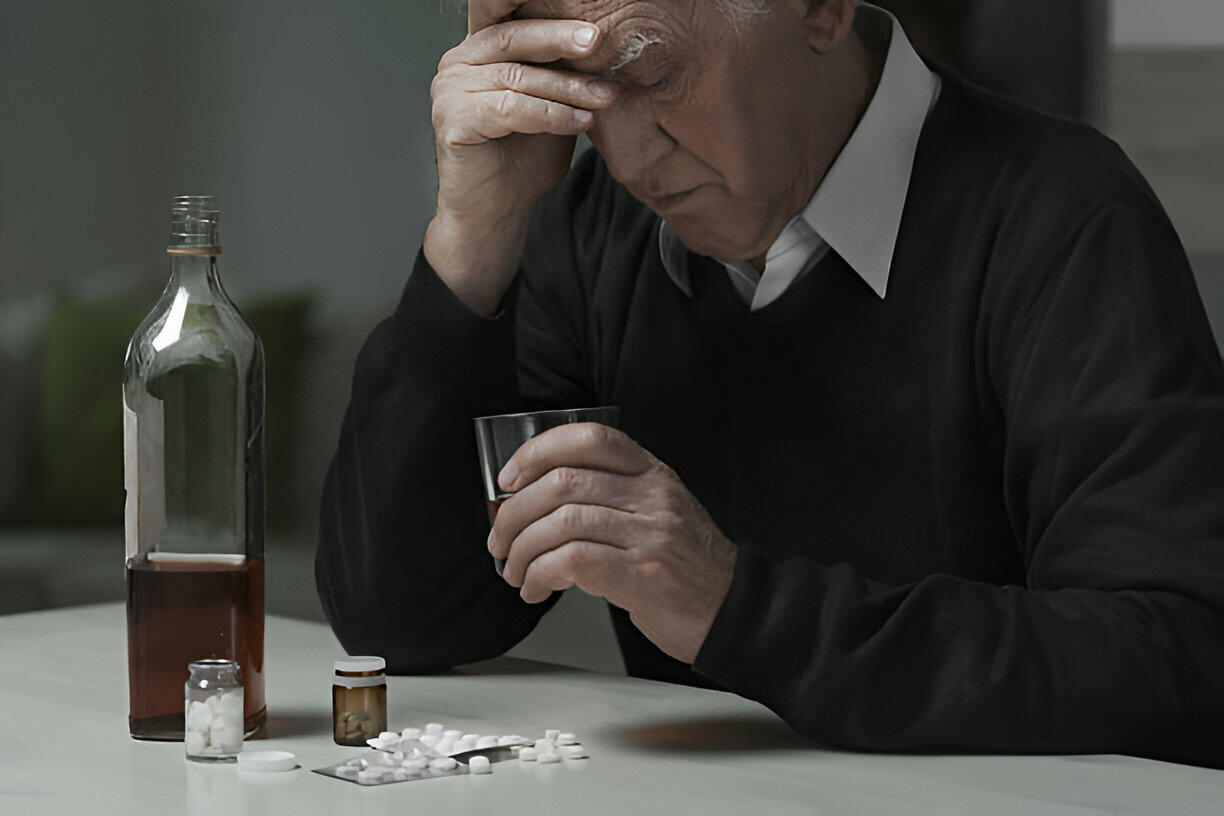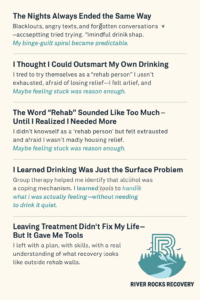The Nights Always Ended the Same Way
I used to think I had a handle on it. After all, everyone drinks. It was “normal” to let loose after work or celebrate the weekend with a few rounds. But my nights didn’t stop at “a few.” They ended in blackouts, angry texts, forgotten conversations, and waking up wondering who I had to apologize to.
Then the guilt would hit. That sinking, skin-crawling feeling that made me promise, “Never again.” But by Thursday—or sometimes even sooner—I was already making excuses to drink again.
The worst part? I knew it was happening, and I still couldn’t stop.
I Thought I Could Outsmart My Own Drinking
I tried everything short of getting help. I made rules: only drinking on weekends, only beer (never liquor), only at home, only with friends. I downloaded sobriety apps, read self-help books, even tried “mindful drinking.” Every strategy worked—until it didn’t.
My binge-guilt spiral became predictable: drink too much, feel horrible, make a fresh promise, break it. Every cycle made me feel weaker. I wasn’t afraid of drinking—I was afraid of how much I couldn’t control it.
The Word “Rehab” Sounded Like Too Much—Until I Realized I Needed More
I didn’t see myself as a “rehab person.” I didn’t lose my job, didn’t get arrested, didn’t drink in the mornings. I wasn’t “that bad.” But I was exhausted. I was terrified of turning into someone I didn’t recognize. I was sick of the mental gymnastics.
I stumbled across River Rocks Recovery’s page on alcohol rehab treatment during a late-night Google spiral. I remember reading: “You don’t have to be rock bottom to get help.” That stuck with me. Maybe I didn’t have to wait until everything crashed. Maybe feeling stuck was reason enough.
Walking Into Rehab Felt Like Jumping Off a Cliff—Then the Ground Caught Me
I checked myself in two weeks later. I was terrified. I expected judgment, isolation, shame. What I got was… relief. People were kind. Detox was rough for the first few days—nobody’s pretending it’s fun—but I had medical staff helping me through it. I had real meals, actual sleep, and no pressure to pretend I was okay.
For the first time in years, I wasn’t running. I was resting.
I Learned Drinking Was Just the Surface Problem
Group therapy was something I dreaded… but it ended up changing me. Listening to people who looked like me, sounded like me, talk about the same private battles—it cracked something open. I realized alcohol wasn’t my real problem. It was my coping mechanism for stress, loneliness, perfectionism.
At River Rocks, I learned tools to handle what I was actually feeling—without needing to drink it quiet.
I Finally Understood Cravings—and How to Survive Them
One of the biggest surprises was learning about the science of cravings. Cravings aren’t weakness—they’re predictable, biological responses. That changed everything. Instead of hating myself every time the urge hit, I learned how to manage it. Rehab taught me how to recognize my triggers, interrupt the thought loops, and move through cravings without wrecking my progress.
Leaving Treatment Didn’t Fix My Life—But It Gave Me Tools
I left River Rocks with more than just a chip and a pat on the back. I left with a plan, with skills, with a real understanding of what recovery looks like outside rehab walls. I learned how to rebuild my relationships, how to handle social events, and how to enjoy life without the “reward” of drinking.
Did I become perfect? Nope. But I became free. I got my mornings back, my peace back, and—for the first time since my early 20s—my self-respect back.
If You’re Asking “Am I Bad Enough?”—That’s Your Sign
I used to wait for proof that I was bad enough to need help. But the real turning point was realizing I deserved to feel good, not just “not terrible.” Alcohol rehab treatment didn’t make me weak—it gave me back my strength.
If you’re stuck in the binge-guilt spiral, wondering if rehab is “too much,” it’s not. It’s enough. You are enough. River Rocks Recovery made me believe that—and they can help you believe it, too.
FAQs About Alcohol Rehab Treatment
1. Do I have to hit rock bottom to go to rehab?
Not at all. Many people enter alcohol rehab treatment before they lose their job, family, or health. Rehab is for anyone tired of the cycle, no matter how “functional” you look on the outside.
2. What is detox like in rehab?
Detox at River Rocks Recovery is medically supervised. You’re monitored, supported, and kept as comfortable as possible. Withdrawal is tough, but doing it with help is much safer—and shorter—than struggling alone.
3. Is rehab just for people who drink daily?
No. Many people who binge or drink heavily on weekends benefit from rehab. It’s about your relationship with alcohol, not just frequency.
4. How long does treatment last?
Programs vary. Most start with 30 days, but you can extend to 60 or 90 depending on your needs. There are outpatient options if you can’t step away for residential treatment.
5. Will people judge me for going to rehab?
Some might—but most people will respect you for taking care of yourself. Plus, the people who really matter will notice the healthier, happier you that comes out of treatment.
6. What happens after I leave rehab?
You’ll have aftercare planning: outpatient therapy, support groups, and practical tools to handle life sober. River Rocks helps you transition so you’re not just left figuring it out alone.
I Thought Rehab Was For People Who’d Ruined Their Lives—Turns Out, It Saved Mine Before I Could
Rehab wasn’t a punishment. It wasn’t a sign I’d failed. It was the first time I got to stop surviving and start living. If you’re tired of apologizing, tired of “fixing it” Monday after Monday, tired of your brain running in circles—there’s a way out.
Call (888) 905-6281 or visit River Rocks Recovery’s alcohol rehab treatment page to see how much life you can get back when you stop the spiral for good.





























